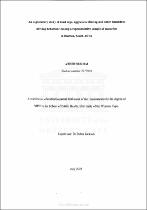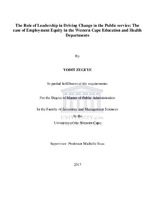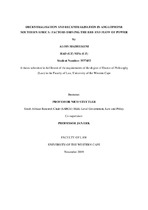An exploratory study of road rage, aggressive driving and other hazardous driving behaviour among a representative sample of motorists in Durban, South Africa
Abstract
Road rage, aggressive driving and other hazardous driving appear to be of increasing concern in South Africa as evidenced by its increasing publicity in the media and discussion in society. Considering the high international prevalence and our staggering road traffic injury statistics, it was pertinent to study to determine the nature and extent of these behaviours. Furthermore, profiles of victims and perpetrators of these and 'other high-risk driving behaviours' were generated by studying associated predictor variables. A total of 1006 participants were included in the study. The target population was urban motorists in Durban and the sample was acquired from randomly selected petrol stations in the Durban Metropolitan Area. The study was a cross-sectional descriptive survey and an interviewer-administered semistructured
questionnaire was used for this purpose. Driver aggression was categorised into four sub-scales: 1) mild, verbal but non-threatening expression of annoyance, 2) verbal or other expression of anger directed at the offending motorist, 3) threatening or intimidating behaviour, 4) experience of rage and 'loss of control', direct confrontation and pre-meditated behaviour. Sub-scales 1-2 provided a measure of aggressive driving behaviour while sub-scales 3-4 provided a measure of road rage. A modified semantic differential on a scale of 1-10 was used to measure aggressive driving and 'other high-risk driving behaviours'. Many predictor variables were identified for driver aggression and 'other high-risk driving behaviours' based on demographics (gender, age, education and race), with general driving characteristics ( driving experience and type of vehicle driven) and with fines, collisions and the carrying of weapons. Based on these results, the broader relevance of the study as well as implications for intervention are discussed under the 4 universal public health strategies for intervention - Education, Enforcement, Environmental modification and Engineering.
Collections
Related items
Showing items related by title, author, creator and subject.
-
An exploratory study of road rage, aggressive driving and other hazardous driving behaviour among a representative sample of motorists in Durban, South Africa
Sukhai, Anesh (University of the Western Cape, 2003)Road rage, aggressive driving and other hazardous driving appear to be of increasing concern in South Africa as evidenced by its increasing publicity in the media and discussion in society. Considering the high international ... -
The Role of Leadership in Driving Change in the Public service: The case of Employment Equity in the Western Cape Education and Health Departments
Zegeye, Yodit (University of the Western Cape, 2017)This research attempts to understand why the progress of achieving employment equity is slow by focusing on the role of leadership in driving change in the South Africa public service. Successful change and subsequent ... -
Decentralisation and Recentralisation in Anglophone Southern Africa: Factors driving the EBB and flow of power
Madhekeni, Alois (University of the Western Cape, 2020)Literature on multilevel government is replete with the virtues of decentralisation as a governing model. As a result, the discourse of decentralisation has found its way into the constitutions, legislation and policy ...




